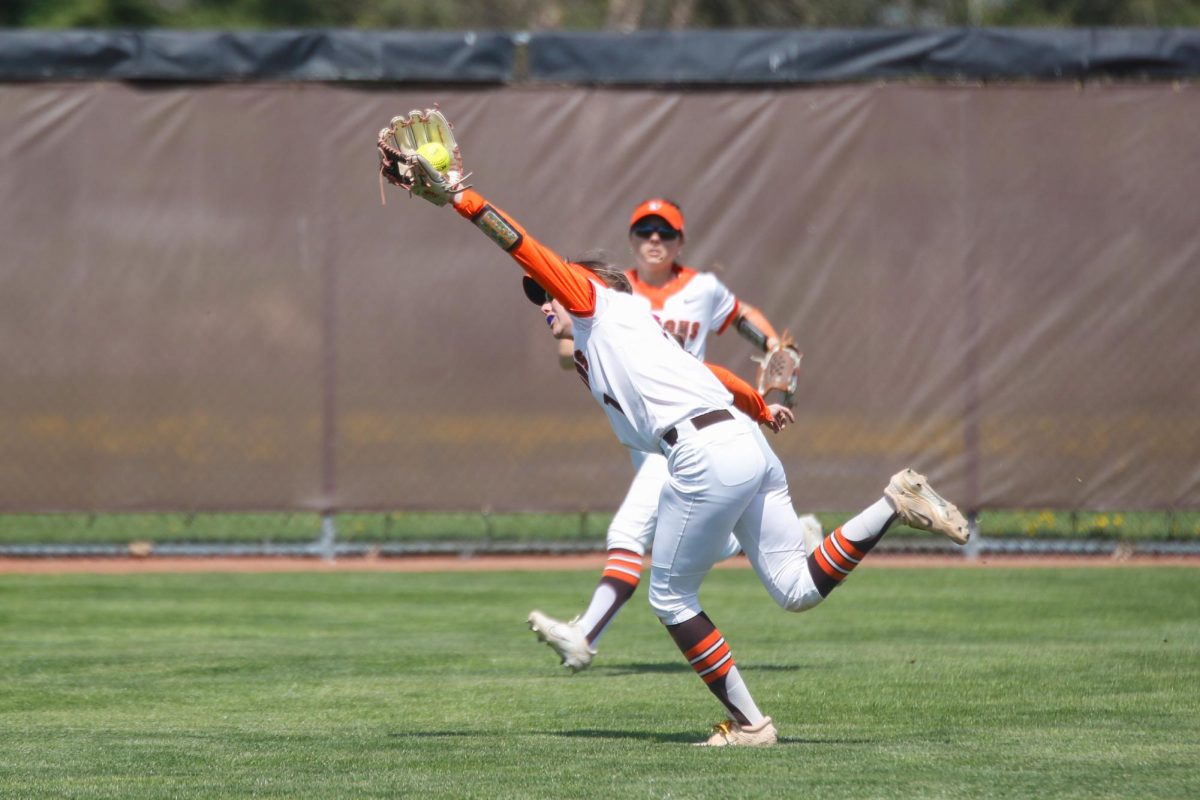Eddie Kipchoge knew he wanted to come to the United States.
‘Since I was little – like eighth grade – I developed an interest in coming to the United States,’ Kipchoge said. ‘That was a long-time dream.’
He used his speed to get here. Kipchoge, who is from Kenya, is a runner on the men’s cross country team.
He had different expectations for his experiences here – he thought he would be a professional runner – but he said his dream has been fulfilled, just in a different way.
Kipchoge is one of many international student-athletes at BGSU. International student-athletes get recruited not only for their talent but also for the different dynamic they will bring to the teams.
Cami Wells coached at Wichita State University before coming to BGSU to coach the cross country and track teams. While there, she said about half of the cross country and track teams were international students. She heavily recruited international students because the local athletes were lost to bigger schools.
When BGSU dropped its men’s track program, Wells began recruiting international students specifically for the men’s cross country team. It was hard for her to find American male runners who wanted to participate in only cross country.
‘The international students aren’t used to having three seasons, so no track isn’t bad,’ she said, whose two Kenya cross country runners keep the team competitive. Kipchoge is the team’s top runner, too.
Finding these student-athletes isn’t always an easy task.
Everything becomes a little more complicated when trying to recruit an international student-athlete, said Ryan Squire, BGSU’s assistant athletic director for compliance.
Traveling to watch an athlete play, the phone calls and their visits are more expensive when international than when national, he said. Academic calendars can be different too, especially for southern hemisphere countries.
‘It’s sort of like a high risk, high reward [situation],’ Squire said.
Wells had Kenyan connections from coaching at Wichita, so she was about to have someone watch prospects and make sure the times she had were legitimate.
Things are a little easier for the gymnastics team.
Kerrie Beach, the gymnastics coach, said the Canadian gymnastics community is familiar with the opportunities available in the US. She’s also had many gymnasts e-mail her with a link to a YouTube video of a performance.
‘They want to continue their education and still do gymnastics. In Canada you can’t play collegiate sports,’ Beach said, and added that no other country is willing to pay for someone’s education because the person has athletic talent.
Frederick Thompson, the men’s soccer coach, said he looks for international student-athletes to have an immediate impact on the team, and he is always receiving e-mails from athletes who think they can do that.
‘It’s still a very big thing to come over and go to school in the states,’ he said.
Thompson has to sort through all the interested athletes and see who will fit in here.
He likes having international students on the team because of experiences he’s had with international athletes.
‘They broadened my frame of reference on life. I’m hoping we can do the same with the kids here,’ Thompson said.
But the changes the international athletes face can be too much for them to handle.
A runner from South Africa a few years back stayed for only one semester. She had a hard time adjusting especially since she had no one to talk to in her native language, Wells said.
Others have to get used to a different style of play. For some of the international student-athletes on the men’s soccer team, they have noticed a difference in the way soccer is played here.
Cameron Hepple, a junior from Bahamas, said games in America are more intense and the biggest, fastest and strongest teams win, rather than the team with the most skill.
Hepple is used to playing for the Bahamas National Team, which he still plays for when he is able. He is going home in March to play in a World Cup qualifying game. This helps keep him from being homesick, too.
Thomas McLean, a Canadian freshman who had been playing for Accrington Stanley in England, said the game has been harder than he expected since he had been playing for a higher level in England.
‘Athleticism seems to make up for a lot of things,’ he said.
He has also had to get used to going to school. For English students, mandatory schooling is finished at age 16, so McLean had been only training and playing soccer when he was in England.
Dusko Topolic, a freshman from Serbia, said soccer here is more relaxed.
‘We play because we like it,’ he said, as opposed to teams at home that he has played on where there is more pressure for success.
The opportunities the international athletes had in their home countries can affect their success rate here.
Wells said it comes down to finding the right student-athletes.
‘You really just need to find a good fit for your program,’ she said.
She used to think there were enough students in the US to fill all the college teams, but she’s changed her mind.
International students bring a different dynamic to the team, making a difference in both the American and the international students’ lives.
Even though the international students on the gymnastics team are Canadian, they still bring something new to the team, Beach said.
‘There’s still a different culture,’ she said.
The international athletes bring a different appreciation to the sport, too, Beach said. US athletes come with high expectations, while the international athletes tend to be less picky.
Jholeen Ponce, a senior on the gymnastics team, said she was really nervous about leaving her home in Winnipeg, Canada.
‘Everything was just brand new,’ she said. She had to get used to not being able to talk to her family as often as she wanted, since she only communicated through the Internet and had to wait for her family to call her.
‘I’ve adjusted well since then,’ she said. ‘Coming here, my team gave me the hardest time.’
Problems other than homesickness and speaking English differently also occur.
Hepple’s first year at BGSU wasn’t a good experience.
He did not get to play because of a paperwork problem. For the first three weeks of the season, he was not allowed to practice, and then when he was allowed to practice, he was prohibited from playing in games and traveling with the team.
Instances like this are what Squire deals with. He is in charge of making sure the athletes the coaches want are eligible to play.
‘You must be an amateur to compete in NCAA. You can’t be paid or compete with players who are paid or have signed a professional contract,’ Squire said.
In order for any athlete to be eligible, there must be documentation that the athlete did not receive more payment than what would have been spent on expenses, Squire said. Any athlete who received payment of any kind is considered a professional and therefore ineligible to play an NCAA sport.
And documenting this isn’t easy, Squire said.
Problems also arise when trying to determine international students’ academic eligibility.
A handbook produced by NCAA states the academic requirements in countries around the world and how their high school standards relate to American standards. There are charts that compare the GPAs from each country, too.
‘Their systems just don’t translate well to the American system,’ Squire said.
NCAA has the final say on eligibility and certifies each student when he or she is eligible. That certification is what Hepple was waiting for and could not play until he had it.
Squire also has to watch out for falsification of records. The NCAA academic eligibility handbook for international students has warning on many African countries’ entries because of previous falsification problems.














